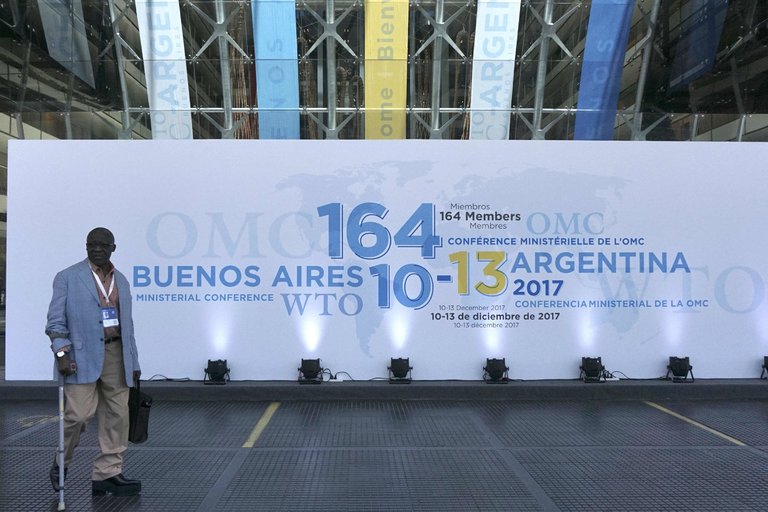
New York Times comments that as officials from the 164 countries in the World Trade Organization gather in Buenos Aires this week for their first major meeting in two years, they will be watching to see whether the United States, once the group's biggest advocate, is seeking to subvert it. The World Trade Organization knits together countries around the world by working to reduce trade barriers and resolve disputes among its members but it has come under criticism not just from globalization's critics. Its supporters have said it has fallen short of its ambitious goals to create trade agreements among scores of countries with different economies, cultures and income levels. But it has never faced such uncertainty as it does now, when its longtime leader and champion, the United States, has turned into a skeptic — putting the future of the group and the kind of broad trade agreements it is aimed at forging in doubt. In recent months, the Trump administration has led the United States in stepping back from its traditional role at the head of global institutions like the World Trade Organization, creating a vacuum in leadership and throwing their future into question. The change reflects a philosophy, shared by the president and his top trade advisers, that the current global structure of rules and organizations compromises the United States' sovereignty and cheats American workers.
The Washington Post writes that Washington is waking up to the huge scope and scale of Chinese Communist Party influence operations inside the United States, which permeate American institutions of all kinds. China's overriding goal is, at the least, to defend its authoritarian system from attack and at most to export it to the world at America's expense. The foreign influence campaign is part and parcel of China's larger campaign for global power, which includes military expansion, foreign direct investment, resource hoarding, and influencing international rules and norms. But this part of China's game plan is the most opaque and least understood. Beijing's strategy is first to cut off critical discussion of China's government, then to co-opt American influencers in order to promote China's narrative. Countries such as Australia, New Zealand and even Canada have been rocked by recent revelations of Chinese-sponsored efforts to corrupt their politicians, universities, think tanks and businesses. U.S. political and thought leaders are just beginning to understand the problem and come together to devise responses. "We have a lot of discussion of Russian interference in our elections, but the Chinese efforts to influence our public policy and our basic freedoms are much more widespread than most people realize," said Sen. Marco Rubio (R-Fla.), co-chairman of the Congressional-Executive Commission on China (CECC). "This is an all-out effort to not simply promote themselves in a better light but to target Americans within the United States." On Wednesday, the CECC will hold a hearing on the "Long Arm of China" to expose Chinese efforts to gain political influence, control discussion of sensitive topics, interfere in multilateral institutions, threaten and intimidate human rights defenders, impose censorship on foreign publishers and influence academic institutions.
- 2017-12-08 China’s commodity demand picks up in November
- 2017-12-07 China criticizes India over drone crash inside border
- 2017-12-06 No. 3 Person of the Year 2017: Xi Jinping
- 2017-12-05 U.S. trade gap soars as imports from China hit record high
- 2017-12-04 Apple CEO backs China’s vision of an ‘open’ Internet as censorship reaches new heights
- 2017-12-03 China's Xi says country will not close door to global internet
- 2017-12-01 China sends its top actors and directors back to socialism school
- 2017-11-30 Obama Told Xi He Wants to Help Preserve Ties, State Media Says
- 2017-11-29 China has 'grave concerns' about North Korea's latest missile test
- 2017-11-28 How the U.S. and China Differ on North Korea
- Reuters China's top paper says Australian media reports are racist
- Financial Times China volatility darkens 2018 investment outlook
- www.huffingtonpost.com China Urges Dialogue to Solve N. Korean Issue
- Financial Times South Korea's Moon to press Xi on Pyongyang nuclear crisis
- uk.reuters.com Japan, US, South Korea to hold missile tracking drill amid North Korea crisis
- Bloomberg World's Largest Water Diversion Plan Won't Quench China's Thirst
- Bloomberg China's Anti-Pollution Efforts Get a Reality Check
- in.reuters.com China starts generating power from floating solar plant
- Reuters China looks to nuclear option to ease winter heating woes
- Wall Street Journal China Celebrates Xi Jinping With Fervor Not Seen Since Mao
- Bloomberg China Audit Finds Provinces Faked Data and Borrowed Illegally
- www.bbc.com German spy agency warns of Chinese LinkedIn espionage
- Wall Street Journal Rare Protests in Beijing Condemn Forced Evictions
- The Guardian Scientists trace 2002 Sars virus to colony of cave-dwelling bats in China
- Wall Street Journal Don't Believe China's Trade Hype
- www.huffingtonpost.com China leverages Belt and Road investment to shape Pakistan's political environment
- Fox News North Korea won't start a war - Trump shouldn't launch an attack
- nationalinterest.org China Is Now Making Some of the Most Powerful Guns on the Planet
